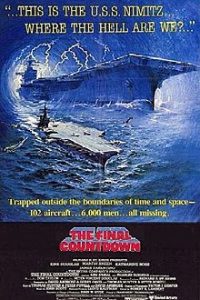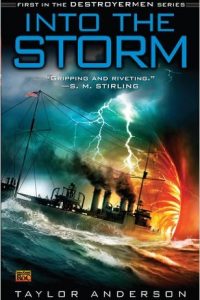 As we all know, speculative fiction is full of sub-genres. Some examples include alternate history, space opera, high fantasy, cyberpunk, post-apocalypse and time travel. There are also oddly specific sub-sub genres, stories that are so weirdly specific and yet, at the same time, incredibly popular. While reading The Emperor’s Men 1: Arrival by Dirk van den Boom, a story about a pre-WWI German cruiser being transported to the waning days of the Roman Empire, I realized there was a sub-sub-genre that I wasn’t sure anyone had talked about before: time travel stories that involve characters being transported to a different place in space and time while on a ship.
As we all know, speculative fiction is full of sub-genres. Some examples include alternate history, space opera, high fantasy, cyberpunk, post-apocalypse and time travel. There are also oddly specific sub-sub genres, stories that are so weirdly specific and yet, at the same time, incredibly popular. While reading The Emperor’s Men 1: Arrival by Dirk van den Boom, a story about a pre-WWI German cruiser being transported to the waning days of the Roman Empire, I realized there was a sub-sub-genre that I wasn’t sure anyone had talked about before: time travel stories that involve characters being transported to a different place in space and time while on a ship.
Now, the idea of someone or someplace being transported back in time is nothing new, but there is a bizarrely large number of stories where the travel takes place while the characters are on board a ship. Perhaps the most famous example is the 1980 film, The Final Countdown, starring Kirk Douglas and Martin Sheen. In this film, the USS Nimitz is sent back in time to December 6, 1941, one day before the infamous attack on Pearl Harbor, and the crew has to decide whether they should intervene and change the course of history. Of course, that isn’t the only film involving a time traveling ship. Another example is the 1984 film The Philadelphia Experiment, which is named after the conspiracy theory of the same name.
Of course, that is just films. You can find many more examples of ships traveling through time in literature. Examples include the Axis of Time series by John Birmingham (where a near-future international fleet is sent back in time to the Battle of Midway), Island in the Sea of Time by SM Stirling (where the Coast Guard ship Eagle is transported along with the island of Nantucket to the Bronze Age), The Ship That Sailed the Time Stream by G.C. Edmondson (where a wooden hulled US Navy research vessel is sent back in time to the Viking era) and the Japanese manga Zipang, written and illustrated by Kaiji Kawaguchi (where a Japanese destroyer is sent back in time to 1945). Indie examples include the Kirov series by John Schettler, Wolf Hunt by Sebastian Breit, Timewreck Titanic by Rhys Davies and Ship Shape and Bristol Fashion by allanpcameron of AlternateHistory.com (which, as far as I know, can only be found on that forum).
 I also found some books that were in the same spirit, even if they didn’t necessarily fit the traditional framework of time traveling ships. Examples include The Lost Regiment by William R. Forstchen where an American Civil War regiment being transported to Virginia by ship finds itself on an alien planet, where they run into human cultures descended from Medieval Russians and Ancient Romans. Then there is Destroyermen by Taylor Anderson, where an American WWII-era destroyer is transported (along with several other ships) to an alternate timeline where the dinosaurs never went extinct.
I also found some books that were in the same spirit, even if they didn’t necessarily fit the traditional framework of time traveling ships. Examples include The Lost Regiment by William R. Forstchen where an American Civil War regiment being transported to Virginia by ship finds itself on an alien planet, where they run into human cultures descended from Medieval Russians and Ancient Romans. Then there is Destroyermen by Taylor Anderson, where an American WWII-era destroyer is transported (along with several other ships) to an alternate timeline where the dinosaurs never went extinct.
So the question we need to ask is: why are there so many stories about ships traveling through time? Well first, water is often used in metaphors regarding time (i.e. timestream) and what do you use to travel on water? A boat! More importantly, ships throughout much of human history were the primary way people traveled long distances to visit exotic lands. This was true, even after the invention of railroads. Its only been in the last century that airplanes have overtaken ships as the preferred method of long distance travel, but ocean voyaging appears to still resonate in our psyche.
Plus, there is something to be said when one of the oldest and most influential works on Western fiction, Homer’s Odyssey, centers around someone sailing home. As far as I know Odysseus didn’t travel through time or alternate dimensions, but he certainly met many strange creatures and cultures…and don’t you find the same thing traveling through time? Be it forward, backwards or sideways?
While humans may not feel the call of the sea as they did before, I have a feeling we will be seeing more stories about floating across the sea of time, whether it’s on a warship, a cruise ship or some other nautical vehicle. Before I end this, let me thank the people at Alternate History Online for helping me write this article. If there are any examples I missed or you have a different theory as to why time traveling ships are popular, let me know in the comments below. I would love to hear your thoughts.











I thought I knew them all, but didn’t.
I’ll add Edmond Hamilton’s 1951 classic CITY AT WORLD’s END, which moves an entire city thousands of years forward. This was a favorite of mine.
And then indie Nachman Kataczinsky’s THE SHIELD, which takes the country of Israel back to the WWII years. Coincidences abound in this sub-genre.
Starships don’t count.
As an ex-destroyerman, I have to think one of the answers would be obvious: you have not one, but a whole shipful of–not only people–but supplies, weapons, clothing, bedding and (probably today) electronic storage of information, which makes our time-travelers more adequately prepared to face a past time in which they’re strangers.